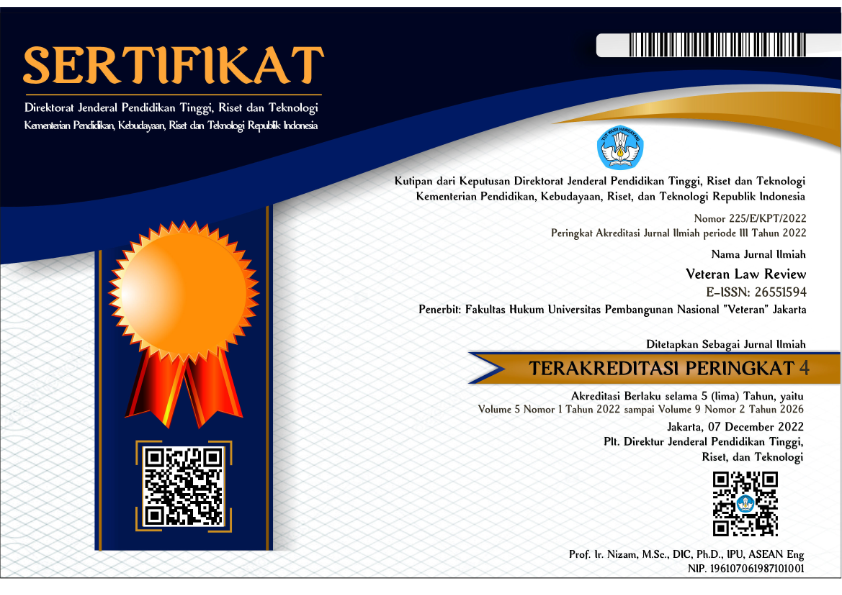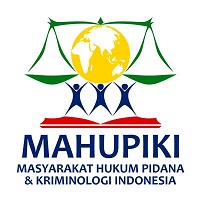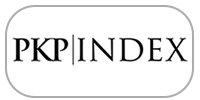Criminal Law Approach to Absentee Land Ownership as A Form of Legal Protection by The State
DOI:
https://doi.org/10.35586/velrev.v6i2.6351Keywords:
Agrarian, Absentee, Criminal LawAbstract
The enactment of the Basic Agrarian Law (UUPA) has changed the constellation of land in Indonesia. The spirit of anti-colonialism is eliminated as much as possible in the regulation of land in Indonesia. There is land that functions as agricultural land that is owned by parties who do not even live where the land is located, known as Absentee. This can hurt the spirit of the UUPA which wants to protect land ownership by indigenous people who live where the land is located. It is felt that the criminal law approach needs to be considered in an effort to protect the spirit of the BAL, in this case absentee land ownership. This legal research is normative legal research using a statutory approach, a conceptual approach that aims to analyze the criminal law approach to absentee land ownership in realizing social justice for all Indonesian people.
Downloads
References
Doner, Peter, Land Reform and Economic Development, Penguin Books, Australia, Ltd, 1972,
Echols, Jhon M dan Hassain Sadhily, Kamus Inggris-Indonesia (an English-Indonesia Dictionary), Jakarta, Gramedia, 2012.
Effendi, Bachtiar,Kumpulan Tulisan Tentang Hukum Tanah,Alumni,Bandung, 1993
Perangin-angin, Effendi, Praktek Pengurusan Sertifikat Hak Atas Tanah,Rajawali Press, Jakarta, 1986,
Gautama, Sudargo, Tafsiran Undang-Undang Pokok Agraria, Alumni, Bandung, 1986.
Kusnandy, Ady, Penelitian Tentang Efektivitas Peraturan Perundang-Undangan Larangan Tanah Absentee, Badan Pembinaan Hukum Nasional Departemen Kehakiman dan Hak Asasi Manusia Republik Indonesia, Jakarta.
Marzuki, Peter Mahmud, Penelitian Hukum, Kencana Prenada Media, Jakarta, 2005.
Muhjad, H.M. Hadin, Nunuk Nuswardani, Penelitian Hukum Indonesia Kontemporer, Genta Publishing, Bantul, 2012.
Rahardjo, Satjipto,Ilmu Hukum, Alumni, 1986, Bandung.
Riyadi, Prasetijo, Memahami Metode Penelitian Hukum Dalam Konteks Penulisan Skripsi/Tesis, AL Maktabah, Surabaya, 2017
Sari, Novita, Penerapan Asas Ultimum Remedium Dalam Penegakkan Hukum Tindak Pidana Penyaahgunaan Narkotika, Jurnal Penelitian De Jure, Vol. 17, No. 3, September 2017.
Setiawan, Iwan, Analisis Tentang Ketentuan Tindak Pidana Pertanahan Dalam Kitab Undang-Undang Hukum Pidana, Jurnal Ilmiah Galuh Justisi, Vol. 6, Maret, Ciamis, 2018.
Siburian, Artha Rumondang, Eksistensi Larangan Kepemilikan Tanah Secara Latifundia dan Absentee (Guntai) : studi di kantor pertanahan Kabupaten Deli Serdang, Tesis, Program Studi Magister Kenotariatan Fakultas Hukum Universitas Sumatera Utara, Medan, 2009.
Soimin, Soedharyo, Status Hak Dan Pembebasan Tanah, Edisi Kedua, Sinar Grafika, Jakarta, 2004
Subekti, Pokok-Pokok Hukum Perdata, Intermasa, Jakarta, 1992.
Utama, Y. J., Kajian Kritis Terhadap Faktor-Faktor Kriminologi Pada Tindak Pidana Pertanahan, Fakultas Hukum Universitas Diponegoro, Semarang, 1995.
Wiradiputra, R., Agraria (Hukum Tanah), Djambatan, 1954, Purwakarta.
Wiriadi, Gunawan, Dua Abad Penguasaan Tanah di Jawa dan Madura dari Masa ke Masa, Jakarta, Yayasan Obor Indonesia, 1984
Downloads
Published
How to Cite
Issue
Section
License
Copyright (c) 2023 Veteran Law Review

This work is licensed under a Creative Commons Attribution-ShareAlike 4.0 International License.
Copyright (c) 2022 Veteran Law Review Journal
Veteran Law Review © 2022 by Faculty of Law Universitas Pembangunan Nasional "Veteran" Jakarta is licensed under Creative Commons Attribution 4.0 International

1. License
The non-commercial use of the article will be governed by the Creative Commons Attribution license as currently displayed on Creative Commons Attribution 4.0 International.
2. Author(s)' Warranties
The author warrants that the article is original, written by the stated author(s), has not been published before, contains no unlawful statements, does not infringe the rights of others, is subject to copyright that is vested exclusively in the author, and free of any third party rights, and that any necessary written permissions to quote from other sources have been obtained by the author(s).
3. User/Public Rights
VELREV's spirit is to disseminate articles published are as free as possible. Under the Creative Commons Attribution-ShareAlike 4.0 International License. VELREV permits users to copy, distribute, display, and perform the work for non-commercial purposes only. Users will also need to attribute authors and VELREV to distributing works in the journal and other media of publications.
4. Rights of Authors
Authors retain all their rights to the published works, such as (but not limited to) the following rights;
- Reproduce the work
- Prepare derivative works based upon the work
- Distribute copies of the work
- Perform the work publicly
- Display the work publicly
- Copyright and other proprietary rights relating to the article, such as patent rights,
- The right to self-archive the article,
- The right to enter into separate, additional contractual arrangements for the non-exclusive distribution of the article's published version (e.g., post it to an institutional repository or publish it in a book), with an acknowledgement of its initial publication in this journal (Veteran Law Review).
5. Co-Authorship
If the article was jointly prepared by more than one author, any author submitting the manuscript warrants that he/she has been authorized by all co-authors to be agreed on this copyright and license notice (agreement) on their behalf, and agrees to inform his/her co-authors of the terms of this policy. VELREV will not be held liable for anything that may arise due to the author's internal dispute. VELREV will only communicate with the corresponding author.
6. Royalties
Being an open accessed journal and disseminating articles for free under the Creative Commons license term mentioned, author(s) are aware that VELREV entitles the author(s) to no royalties or other fees.
7. Miscellaneous
VELREV will publish the article (or have it published) in the journal if the article’s editorial process is successfully completed. JOSI's editors may modify the article to a style of punctuation, spelling, capitalization, referencing, and usage that deems appropriate. The author acknowledges that the article may be published so that it will be publicly accessible and such access will be free of charge for the readers as mentioned in point 3.

















